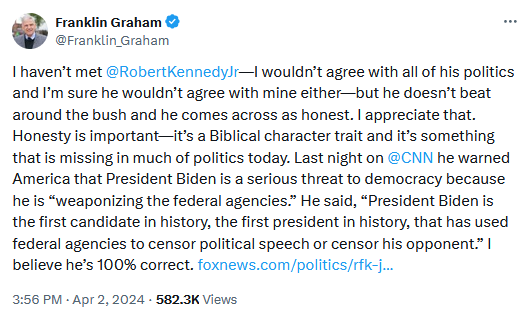
I don’t write much about religion. I’ve been upfront about being a true-believing Christian, but when it comes to cultural commentary, I prefer writing about other things.
Part of the reason is that I view my faith as a personal relationship with God, and thus don’t feel the need (nor desire) to inject scripture or other biblical teachings into my expressed thoughts on politics and other topics. Instead, I focus on presenting logical and principled arguments that I hope connect with people regardless of their religious beliefs.
Also, I happen to think that intertwining politics with religion can get pretty ugly, especially in the case of partisan politics.
Faith shapes countless people’s views, of course. That’s largely the point of organized religion. It’s neither strange nor necessarily objectionable that those views would carry over into an individual’s thoughts on public policy or governance. Personal perspectives aren’t a violation of the separation of church and state.
What makes me extremely uncomfortable (and even angry), however, is when religious leaders use their spiritual platform to engage in factional political battles.
One high-profile example of this, which many conservatives will remember, is Reverend Jeremiah Wright. The Chicago pastor’s wild political rants became a national news story in 2008, when his most famous parishioner, Barack Obama, was running for president. The videos of Wright’s rhetoric, reportedly sold in the church’s gift shop, served as dirt for Republicans who worked to link the reverend’s radicalism to Obama’s past writings and political sensibilities. The most appalling aspect to me, however, was that Wright was spewing his hateful, Keith Olbermann-style diatribes from the podium during church services.
It blew my mind. It even felt damaging to the faith.
I considered that maybe this type of thing went on more than I realized, and that there were politically left-wing and right-wing religious leaders across the nation who followed similar practices. But I certainly didn’t see it at the church I attended, nor did I hear about it happening at friends’ churches. The closest my pastors had ever come to engaging in politics was the weekly inclusion of a prayer that our “political leaders” make “wise decisions.”
As far as I’m concerned, that’s how it should be. I’d rather church leaders, in their spiritual and professional capacity, not even evoke politicians’ names (unless it’s in regard to a health struggle, death, or something of that nature). I understand that there are some natural alignments between religious views and public-policy positions, but spiritual faith should always transcend partisan politics.
These days, however, I see example after example of religious leaders adopting political partisanship as a major component of their faith. And the starkest examples of it are on the political right.
Some of our nation’s most prominent evangelical leaders not only issue full-throated public endorsements of politicians, but effectively serve as their personal defense attorneys. People like Tony Perkins and Franklin Graham willingly and enthusiastically twist themselves into theological pretzels to exempt even an individual as profoundly immoral and un-Christian as Donald Trump from their long-preached biblical beliefs (a luxury they, of course, never afford to Trump’s opponents).
On a whole host of issues and moral stances, Trump is treated like a sacred presence that floats high above the judgement of man and the consequences of sin. I’m pretty sure that’s not what the Christian faith is supposed to be about.
I mean, one doesn’t have to be a biblical scholar to recognize that false idolatry has traditionally been a bad thing in Christian circles.
Graham has even gone as far as mocking those who are offended by Trump’s unscrupulous conduct, along with those who won’t vote for him, while celebrating church signage (which has traditionally been used to spread messages of hope, faith, and grace) that promotes Trump and takes pot-shots at Joe Biden.
Just the other day, Graham wrote this to his millions of followers on social media:
Whether you agree with Graham’s assessment of Kennedy, or whether you believe that our federal agencies are being “weaponized,” how can one possibly square the circle of a devout defender of Donald Trump (a politician who’s never met a microphone or keyboard he hasn’t lied through) not only lamenting the deficit of honesty in today’s politics, but doing so in biblical terms?
And how does such glaring hypocrisy from top evangelical leaders not cheapen the Word these people have vowed to spread?
The Atlantic’s Tim Alberta and the New York Times’ David French have written extensively on this topic, but I’m now even seeing the problem locally. Friends in my city have reluctantly left their churches over church leaders effectively and incessantly preaching the Gospel of Trump, and the importance of voting for him as a demonstration of their faith. Some churches in my town even have digital marquees above their parking lots specifically calling on support for the former president, a guy who routinely makes a mockery of the Christian faith.
This is not how you grow the faith, and it’s no more the proper role of church leaders than Reverend Wright carrying on about 9/11 and “chickens are coming home to roost.”
I honestly don’t know how many of these individuals have been genuinely compromised, and how many are responding to the sentiments of their congregations, but what I do know is that it’s a profound failure of leadership that strikes at the very heart of our culture.


















Many church leaders are playing the same game as cable news hosts - pandering to their audience. Partisan politics have replaced Christianity as our majority national religion. Wokeism on the Left, Trumpism on the Right.
Goddamn America. Goddamn selective amnesia.